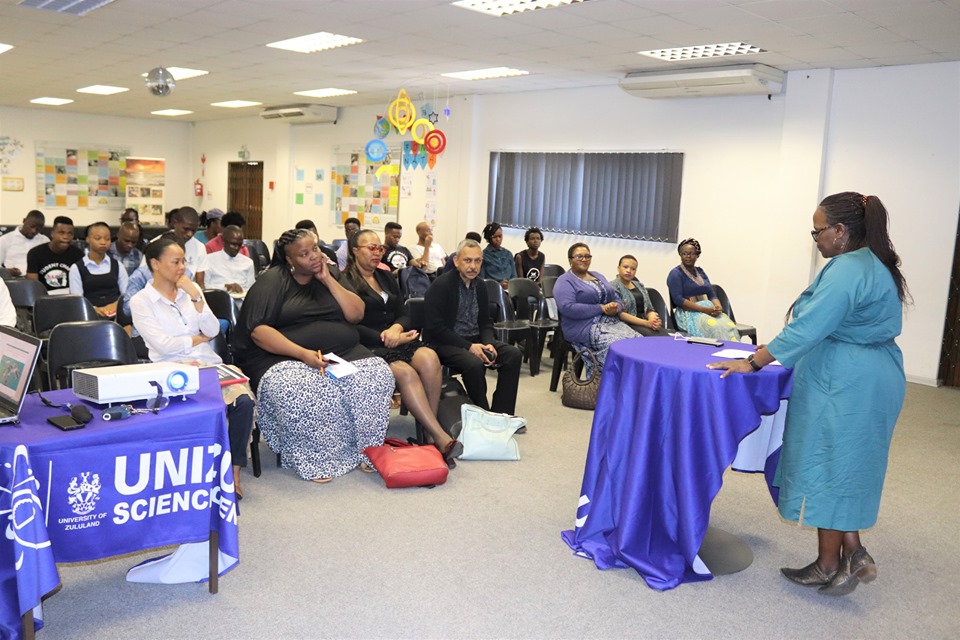UNIZULU hosts the informative Seminar on Indigenous Knowledge Systems

The Indigenous Knowledge System (IKS) has been used as the melodic instrument to tune some cords in the society. The IKS refers to local knowledge and information that is unique to a given culture or society. This awareness includes all forms of knowledge technologies, know-how skills, practices and beliefs that enable the community to achieve stable livelihoods in their environment.
The UNIZULU’s Indigenous Knowledge Documentation Centre and the Consumer Sciences Department recently hosted the informative Indigenous Knowledge Systems (IKS) seminar at UNIZULU’s Science Centre, Richards Bay. This colloquium was themed: IKS Governing Laws and Regulations in the South African Context. The interesting session was officially opened by Prof Nokuthula Kunene, Dean of Faculty of Science and Agriculture and it was blessed by the presence of Amakhosi from King Cetshwayo District, community members, undergraduate and postgraduate students from UNIZULU.
The seminar focused on protection and preservation of indigenous knowledge, management and advancement of indigenous knowledge, as well as utilization of IKS as discussed in last year’s deliberations and recommendations. The Indigenous knowledge systems plays a dynamic role in societies as it helps to shape and defines their very existence and provides the foundation for their beliefs and traditional practices.
Prof Nokuthula Kunene in her welcoming remarks unpacked the whole idea behind the innovation of these seminars and colloquiums as they are the pedestals and can be utilized as the platform to transform the society in all spheres that are discourse to the Indigenous Knowledge Systems within the society, from water conservation, food security etc.
Kedi Aphane from Department of Science and Innovation, National Indigenous Knowledge Office, on her presentation, she alluded on the importance of documentation on National Indigenous Knowledge Systems Centre. She pleaded with the attendees that keeping the knowledge they have documented it is an advisable practice as it is important to preserve information for future generation. She further expounded on what kind of information qualifies to be documented in the Documentation Centre.
Shumi Pango from Department of Science and Innovation added that more on clarities about the laws and regulations of IKS. She started from the time of drafting the policy and the history behind the IKS Act of 2019 which was signed by the president of Republic of South Africa, Cyril Ramophosa, on the 21st of August 2019. She emphasized the importance of the act and its 16 disciplines that bring more light about the Act.
Pango also emphasized that people should bear in mind that indigenous knowledge is not only related to traditional healers but even the indigenous astronomy, agricultural side, the traditional attires and also the sports indigenous knowledge needs to be considered.
“The indigenous community according to the interpretation of this law it’s divided into two, firstly the information that is known by everyone in that village and also the bloodline of an individual (family),” she said.
Michael Ofori-Appiah from Council for Science and Industrial Research (CSIR) responsible for the development and management of the national indigenous knowledge recordal system, elaborated in-depth about the database of the people who have the knowledge and how to register to the database, what is needed to get into the database, who qualifies to be registered and what does the catalog look like.
Prof Unathi Kolanisi, the deputy dean of Teaching and Learning in the Faculty of Science and Agriculture concluded by encouraging people to be proud of themselves and the golden knowledge they have which is very important for the country at large.
Mdumseni Nxumalo, the coordinator of Indigenous Knowledge Systems Documentations Centre funded by the Department of Science and Innovation thanked Amakhosi for their presence in the seminar, “If you want to develop the community it is better to work together with the traditional leaders as they are the leaders of societies,” Nxumalo concluded.
-Nhlakanipho Fortune KaNxumalo














One Comment
Can you be more specific about the content of your article? After reading it, I still have some doubts. Hope you can help me.